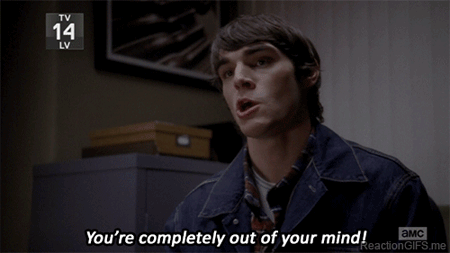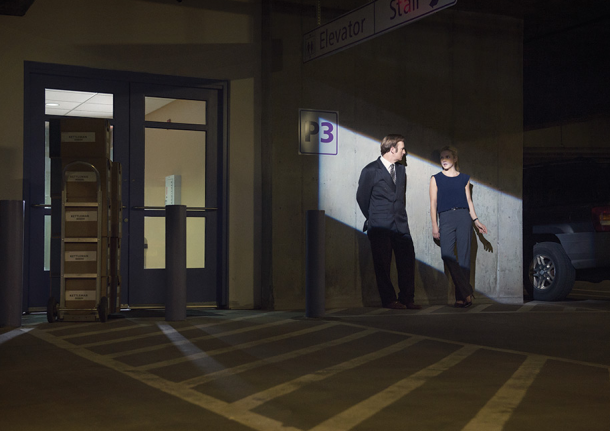My favorite part about watching so-called “prestige” television is the conversation that it engenders. Not just in terms of the social media response (and all the jokes, memes, hypotheses, and tasseographies that are so integral to that response), but also the experience of catching up with friends the next day to talk about what you liked and did not like about the latest episode. On this very website, we once ran a blogcat that consisted entirely of the transcript of our Facebook group chat about an episode of “Breaking Bad”. And we not alone in this; the broader “conversation” about a TV show has in many ways become more important than the show itself, even informing how shows are made, marketed, and released. “Westworld” is arguably the pinnacle of this phenomenon, with the attempt to force a specific social media response being ingrained into the very DNA of the show, while the show-runners sprinkle fake websites and hidden messages around the Internet like some sort of trollish, Twitter-savvy Johnny Appleseeds.
So it is disappointing to me that there is not much of a conversation going on around one of my favorite shows, “Better Call Saul”. Not just one of my personal favorites, but (hot take alert) one that I think is actually a better show than its predecessor.

Not to say that it is necessarily more entertaining than “Breaking Bad”, or that it necessarily deserves as secure a spot at the top of the pantheon, but that in many ways the execution of “Better Call Saul” is superior to that of “Breaking Bad”, despite never capturing the conversation in the same way.
Sure, there are dedicated reddit threads to breaking down every frame plus the episode reviews and occasional think-pieces on various pop culture websites, but the same can be said for everything ranging from the second season of “True Detective” to “Young Sheldon”. People watch the show (in fact, the first two seasons had higher average per-episode viewership than any but the final season of “Breaking Bad”), and the general critical consensus is that it is a “good” show, but nobody really seems to care about it all that much. There are people talking about the show, but there isn’t much of a conversation, in the way there was for “Breaking Bad”, the way there is for “Westworld”, or for any other number of “prestige” TV dramas. While part of this has to do with the way the saturated TV market has destroyed the sense of monoculture that reigned during the Golden Age of Television, part of it has to do with the way “Better Call Saul” is zigging while the rest of the broader world of prestige TV dramas is zagging.
To call “Better Call Saul” a slow burn is an understatement. It makes slow burns look like the bus from “Speed” (or the boat from “Speed 2: Cruise Control”, if you’re a fan of rousing ocean liner adventure stories). It isn’t even really a burn at all. It’s like ceviche: instead of cooking the fish with heat, you marinate it in lime juice. The effect is approximately the same, but it takes longer. The show eschews most of the formulas that have made its contemporaries so beloved: it lacks the large action set-pieces of “Game of Thrones”, it doesn’t buy into the bread-crumb and fake-out dinner theater mystery structure of “Westworld” (or the freshman philosophy major moralizing, for that matter), it’s not heavily steeped in specific stylistic trappings like “Stranger Things”, and it’s not a neat, tidy closed-story like any of the miniseries, limited series, or anthology shows that have become increasingly popular in the new TV environment. Even when the show does succumb to the temptations of adrenaline, as it does with Mike Ehrmantraut’s sub-plot, it builds to it slowly and then wraps it up quickly and neatly. Even the way the show reveals the origin of the name “Saul Goodman” is intentionally subdued and anticlimactic.
More than anything, “Better Call Saul” seems to have an almost pathological aversion to exposition. There are many times throughout the show’s run where we watch a character (whether it be Jimmy McGill, Charles McGill, Mike, or even Kim Wexler) preparing for some plan, plot, lie, or other event with no dialogue or context given to the audience to walk them through the situation. The viewer is forced to watch a montage of a character performing some seemingly irrelevant task (like Mike throwing a pair of sneakers over a power line in the middle of the desert), the purpose of which only becomes clear at the end, when everything suddenly clicks together.
And, of course, in true “Breaking Bad” fashion, there are no closed story arcs. For every action, there is an equal and opposite reaction, such that every plot point and subplot flows and melts seamlessly into the next one. It’s hard to even definitively identify specific story arcs; not only is everything inextricably linked, but the plot rarely follows a traditional story structure with discrete rising and falling actions.
The main plot thread at the heart of the show is the relationship between Jimmy and his brother, Charles. A relationship that is established at the beginning of season 1, but takes almost the entirety of the show’s three seasons to reach its inevitable conclusion (and pay off). In the interests of avoiding spoilers, I will keep things general, but I could write an entire blogcat just on the development of this relationship and the profundity of the duality between the two brothers. Suffice to say, the dynamic between the two (both in terms of who has the upper hand within the world of the show, and in terms of who has the moral upper hand in the eyes of the audience, and the way the show plays with those two concepts) is in constant flux, with each a reflection of the other as in a mirror darkly. In some ways, it is reminiscent of the dichotomy between Walter White and Hank Schrader in “Breaking Bad”, and the way the show played with the notion of a hero and who the audience is rooting for.
To me, though, it is more reminiscent of the dichotomy between Dismas, the penitent/good thief, and Gestas, the impenitent/jerk thief (a reference that will endear me both to scholars of Biblical apocrypha and to fans of “Uncharted 4: A Thief’s End”). As we already know from “Breaking Bad”, Saul Goodman (i.e. Jimmy McGill) is a “criminal lawyer” not a “criminal lawyer”, someone who will play fast and loose with the law for his own benefit. The brilliant trick that “Better Call Saul” performs, while tracing the origin of Saul Goodman, is to blur the lines between the two concepts. Jimmy is a former con-artist/hustler trying intermittently to become a respectable lawyer, occasionally unable to resist falling back into his old habits (at times for his own benefit, at times to help others), while his brother Charles is an established, respectable lawyer who is just as adept at those same habits (but only, in his mind, for the greater good, to uphold the sanctity of the law).
Earlier in this piece, I had the hot take that I think “Better Call Saul” is better than “Breaking Bad”. And it is the heart of the relationship between the McGills, and the way the show develops it, that leads me to say this. One of the most talk-worthy aspects of “Breaking Bad” was the constant conversation about the duality of Walter White vs. Heisenberg, between good and evil, and the way the show blurred the lines between the two. “Better Call Saul” pulls the same basic trick, but it is both more complex and more subtle. Not only do we have the duality of Jimmy McGill vs. Saul Goodman, but we have the duality of Jimmy vs. Charles McGill, and Jimmy vs. Kim Wexler, Charles vs. Howard Hamlin, and this all without even getting into Mike’s subplot and the way that interacts with Jimmy’s. All of this is wrapped in the same visual language of “Breaking Bad”: the same clever cinematography, intricate montages, lingering shots of desert skies, use of light and shadow, etc. But in a way it is more polished and consistent. The word I would use for it is “mature”; Vince Gilligan and Co. took the lessons they learned from “Breaking Bad” and smoothed out the rough edges.




The great Andy Greenwald described “Better Call Saul” as that hole-in-the-wall Italian restaurant that doesn’t have a website or a page on Yelp, but they’ll give you the best Italian food you’ve ever had. I’d extend his metaphor a little further. It’s the type of small local restaurant that you always know will give you a great meal but you never think to go there, except maybe once a year when your parents are in from out of town and you want to show them something special. It may not make it into your regular rotation, but it will definitely make for a memorable meal. And maybe the best way to end a piece isn’t to mangle a metaphor made by another writer, but why end this in a traditional way if I’m writing about such a non-traditional show as “Better Call Saul”?
